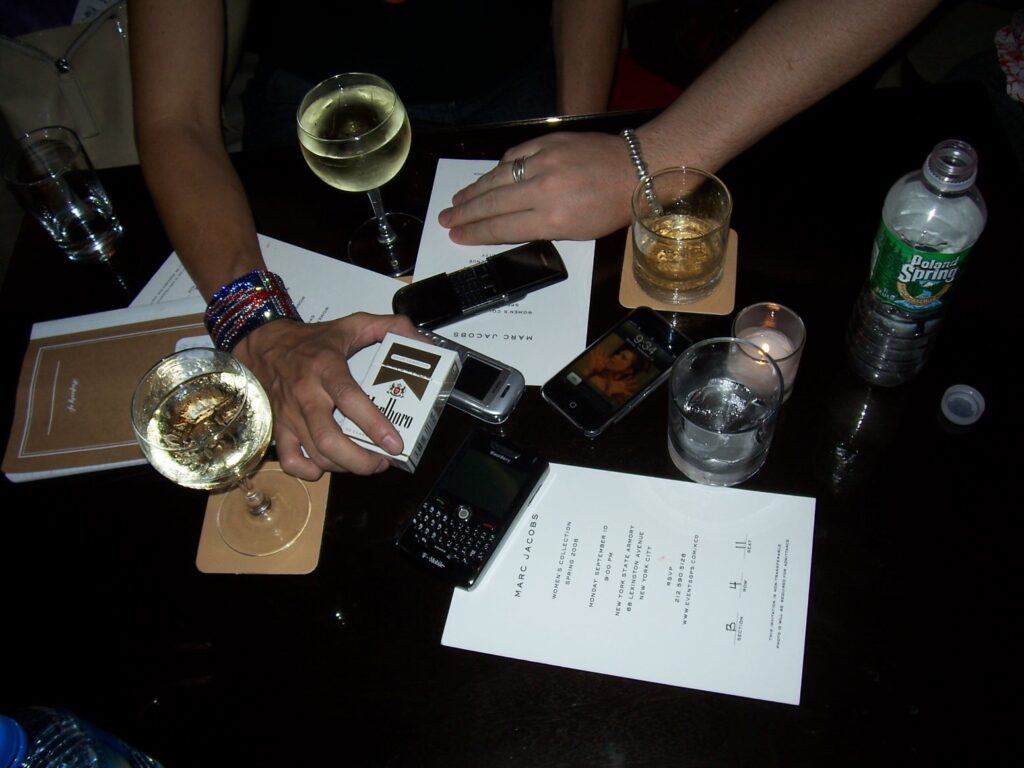Today is Star Trek day. The original series debuted 55 years ago. I was searching for a photo of myself as a child wearing a captain’s uniform to commemorate it and instead stumbled upon a file containing my old WordPress blog. So rather than find an adorable picture of me in a red jumpsuit I found this picture from September 10th 2007 waiting for the Marc Jacob’s fashion show.

I used to be a fashion blogger you see. I have a few dubious CV distinctions, one of which is being the first person to live blog fashion week (at least according to Women’s Wear Daily). In the late aughts just before the Great Recession, it was a hell of a time to work in fashion and I wanted in. Being utterly unqualified I did what any kid would do and started a new media company. It went pretty well, we turned it into an ad tech company, sold it, and survived “RIP good times” but before all of that I partied professionally. A lot of business in fashion used to get done over drinks in fancy hotel lobbies while we all clutched our Blackberries.
This particular photo represents a time when Condé Nast still mattered. I was at the Mercer Hotel with my friend Lauren Goldstein Crowe (also apparently economic writer Felix Solomon). My friend Lauren was the newly installed fashion columnist for the new glossy magazine about money called Portfolio Magazine. We were killing time in the then trendy Soho hotel before the always reliably two hours late Marc Jacob’s show.
I don’t actually remember if I legitimately had an invitation or if I snuck in with Lauren that season. Back in 2007, if you can believe it, social media was considered very uncouth and no one has begun writing “bloggers are taking over the front row” thought pieces yet. Could have gone either way.
Portfolio was the last hurrah of the print behemoths, a glossy magazine dedicated to the culture of finance, so naturally I was appreciative that I could tag along with my much better financed friend. Condé Nast reported spent 100m on the magazine and I appreciate that some small portion of that went to drinks before the fashion of the season. Lauren is an especially erudite editor, of the sort who writes deeply studied long form work, so the fact that Condé Nast was paying to send her to fashion week was pretty decadent. She wasn’t a mid tier market editor who needed to see the clothes. She covers culture so the entire milieu was her domain. The gossip before the shows absolutely counted.
Of course, the business of media couldn’t support that sort of thing forever with changing advertising models and Condé Nast didn’t really keep up with the times. It’s a real loss. People like me ended up winning and it’s been perhaps a net loss for some things that were valuable cultural artifacts.
I spent no more than a couple grand getting our rinky dink operation up and running. We still managed to publish faster than anyone else. I had several meltdowns in service of that effort. In hindsight it was probably a waste but it felt so very new and urgent to be publishing things at the very second a look went down the runway. Now fashion week is an exercise in instant publishing and live-streaming everything from a million perspectives. But the actual studied writers don’t get expense accounts and drivers and corporate Blackberries anymore. If they are lucky maybe they have a blog with a subscription. Lauren knew it even then. She and I slowly occupied the same basic space in the ecosystem. She was just 15 years ahead of seeing it.